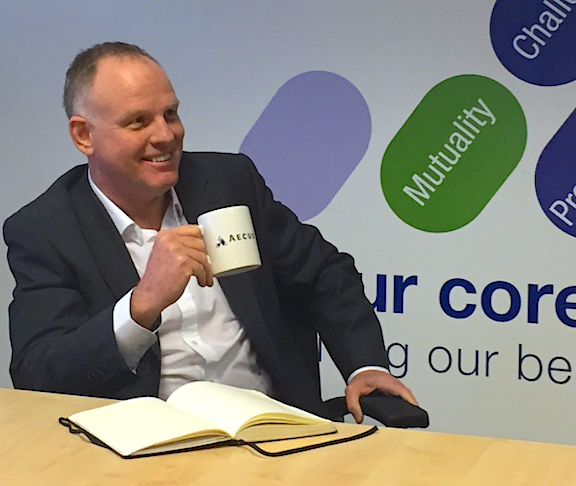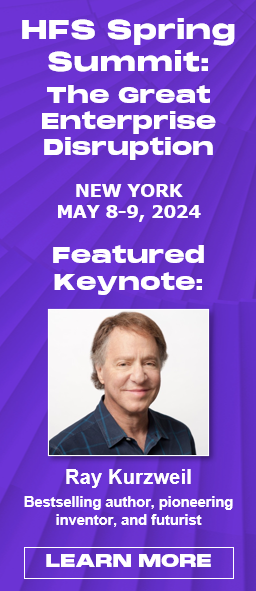We recently had the pleasure of hearing from Alsbridge’s CEO, Chip Wagner, regarding his firm’s organic expansion plans into Europe as his firm cements its growing reputation in the sourcing advisory market. But what about the UK advisory firm formerly known as “Alsbridge Plc”? Answer, it renamed itself “Aecus“, named after one of the sons of Zeus, renowned for wisdom and piety, and his fairness as a judge. He was a resolver of disputes between the gods.
So we caught up with the firm’s founder and managing partner, Rick Simmonds, to find out more about his renamed business, the split with Alsbridge mothership, the renewed focus on the new firm and whether their famous “speed dating” approach to provider selection is effective for clients…
Phil Fersht (HfS): Good morning Rick – can you share your background with our readership? When did you get into this outsourcing business?
Rick Simmonds (Aecus): I’ve been in outsourcing for a long time. I started in the late 1980s with Andersen Consulting in the pre-Accenture days, working for David Andrews who went on to set up Xchanging. Then I helped Ernst & Young set up its outsourcing practice in the 1990s. They sold this division to Cap Gemini; which I left in 2002 to set up ALS Consulting.
Ben Trowbridge was a partner of mine at Ernst and Young; he left to start Trowbridge Group. We merged our two brands to become Alsbridge. Two years ago Trowbridge sold his firm to a private equity group and left last year.
We were structured a bit like a Big Four partnership, just two separately owned businesses. We were wholly owned in each country and shared a brand and IP. That’s the arrangement that came to an end. In December last year Alsbridge PLC left the Alsbridge group and rebranded as Aecus, a consulting and benchmarking firm providing tailored sourcing advice to its clients across Europe.
Phil: So what was the thinking behind the Alsbridge split, Rick?
Rick: Two things really, Phil:
- The management structure. Neither side had control of the other. That created a control issue, which we happened to trigger. We couldn’t be sure there wouldn’t be a difference of view of the future in the future.
- A difference of focus. We both focus on outsourcing and shared services advisory services. We have a strong BPO heritage, they have a strong telecom focus which we don’t have. So there were some slight strategic differences.
But there was no particular problem – the decision to separate was really just an evolution, things changing over time.
Phil: What geographies are you going to focus on? UK? Europe? Are you going to enter the US market?
Rick: Our focus is NOT just the UK, it’s the entire European market. Many of our hot spots are outside the UK; we are strong in places like Switzerland and the Nordic and Benelux countries and that will continue. We recognize the complexities of the European market.
We have no intention of entering the US market. We have a European heritage with European DNA. We have the biggest and most experienced team in the market from that point of view.
Phil: As you look at the current level of demand in the UK and Europe, we see a lot more BPO deals popping up. What does your current business look like? Is it a mix? More IT? Or are you getting into the BPO growth areas?
Rick: Traditionally our business has been 50 percent BPO and 50 percent ITO and it’s that way today. We have seen a lot of BPO activity recently as well and that’s good strength for us; our heritage has a strong emphasis on BPO.
The current business is very much multi-country–not necessarily global but within the European countries. That’s a strength of ours too.
The other thing we are seeing is second and third generation ITO deals coming through more and more, so that’s becoming more of a focus for us as well. This is how the market has changed.
We see some pretty big deals coming through in both ITO and BPO. There’s a lot of churn.
Phil: So, Rick.. do tell us about the “speed dating” we’ve been hearing about. Is it a one-off thing one of your employees dreamed up or an official company methodology?
Rick: Ben (Trowbridge) and I developed it years ago and we’ve been using it on both sides of the Atlantic for quite a long time. It will remain part of the Aecus methodology in a slightly different version going forward. We call it “Supplier Scan”, which focuses on the RFI part of the methodology. The point is to help clients quickly focus down on the few players they should pay proper attention to in the buying practice.
Here’s how it works: Instead of preparing a document-based RFI, which we found isn’t particularly helpful since we already have most of that information and it doesn’t differentiate organizations really well, we bring providers into short workshops with a client. We might go through 8, 10, 12 organizations.
The point of the session is not to test their fact base but instead to test the chemistry of the two organizations. We want to see to what the degree the provider can demonstrate a reasonable understanding of what the client is looking for. Can they create empathy? How would they work with the client? Will and how will they customize? That’s the process we have been using.
What have you heard about this?
Phil: There were a couple of disgruntled providers who went through the process; they were unhappy they were deselected!
Rick: The problem with this is it gives everyone an equal chance. Clearly, if you are giving 10 organizations an equal chance and the buyer picks four to go through the selection process, then you can have six who are disgruntled.
The advantage to providers over the traditional RFI process is it gives them an opportunity to engage. It might not work out for them. But they are not just thrown into a document-based process they can’t control.
Secondly, it doesn’t take a huge amount of effort for them either. They are coming to a two-hour workshop. As long as they bring people who are knowledgeable and engaged about what they do, they don’t need much customization. We provide a briefing on the client’s business context, challenges and constraints. Then they bring an expert, multi-disciplined team who can engage knowledgeably with the client about possible solutions and approaches. It is short, sharp and focused.
So there are two advantages to this methodology:
- Providers actually get the chance to engage with the executives of the client.
- They aren’t locked in an office preparing RFI documents for ages.
This process is clean and efficient. Personally I would prefer that to sweating over documents and sending them to be analyzed in isolation.
Phil: So there is no documentation at all? It’s just literally a speed dating situation?
Rick: It varies, to be honest. We’ve had providers make formal presentations before they engaged in discussions; it was a combination of the two. We are not fundamentalist about this: it’s what works for the client. We customize this for the client for whatever they want to do. We are always client-driven in this process. We don’t make down selection decisions for our clients, we just facilitate the process. We have never made any of these decisions for our clients; we just advise the community.
Phil: Please look into your crystal ball for 2015. What sort of business do you think you will be engaged in this year? A lot more BPO or will you be pulled into other areas like robotic automation?
Rick: Both actually. We carried out a lot of research into innovation in the outsourcing market over the last year. The Alsbridge Innovation Awards, which were purely an Alsbridge Europe initiative and have now been re-branded as Aecus, were well-subscribed last year and will happen again this year. Last year we had 50-odd submissions and gave out 15 awards in the areas of digital innovation, robotic automation, etc.
There’s a convergence now between BPO and ITO and the innovative technologies providers are using. We are trying to position ourselves to be in the forefront of that. One of the reasons we sponsor these awards is because it helps us learn and understand what’s really out there and therefore helps us advise our clients appropriately. So that will be the main thrust of what we are doing.
We have clients now in their second and third generation of traditional outsourcing; they already have good experience going through the process, so they are not looking to organisations like us for help with the basics of that any more. We now have to provide relatively forward-thinking, high-quality boutique services to differentiate ourselves from in-house providers or the contracting market. Part of that is to understand the supplier market, where it’s going and what can be delivered. That’s where our focus is going to be.
Phil: Rick – it’s been a pleasure and am sure many of our readers will enjoy reading your views. Good luck with the new venture!
Rick Simmonds (view bio) is Founder and Managing Partner for UK-based sourcing advisory firm Aecus. You can email him here.
Posted in : Business Process Outsourcing (BPO), HfSResearch.com Homepage, IT Outsourcing / IT Services, Outsourcing Advisors, Outsourcing Heros, Robotic Process Automation, Sourcing Best Practises








I applaud the egalitarian ethos in Rick’s speed dating approach however isnt there is a danger it could push the BPO industry back to the commodity world of 10 years ago? To assume that 8, 10 or 12 players are all alike and its just about scoring 2 hours of charismatic discussion doesnt feel sensible for those clients with complex transformation needs.
@Carina – I’m with you on that one. Why advisors need to invite more than 6/7 providers to a BPO dance, in the first place, baffles me these days – they should know who are the best fit for the clients’ needs. I do like the spirit of the speed dating, but with so many client engagements suffering from “transactional fatigue” the due diligence needs to be more focused on how an engagement can evolve over 5-7 years, not 1-2 hours 🙂
PF
Carina/Phil, you raise great questions. At Aecus ultimately our responsibility as advisers is to help the client make the best decisions, within their time and budget constraints, and part of that responsibility is helping suppliers get their capabilities across. Depending on the scope of the project, a Supplier Scan may be appropriate or not, and where it is relevant I would agree that it doesn’t usually make sense to approach more than 6 or 7 alternatives (with complex multi-function / multi-region scope then things may be different). In all cases a ‘speed date’ activity is only part of a process, to be augmented by detailed engagement and behind the scenes coaching on what is possible and what is realistic. I couldn’t agree more that the best BPO relationships look far beyond ‘commodity services’, to how to create new value over the long term, that is the most exciting opportunity in BPO today. Paul
[…] great Alsbridge European mystery, with their previous UK entity being reincarnated under the name Aecus (the son of Zeus) and Alsbridge US preferring to grow its own European business, as opposed to […]